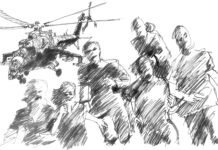By Rick Stanton
 Let me confess right away: I benefited from a college athletic scholarship in baseball. It was back in the day, but benefit I did.
Let me confess right away: I benefited from a college athletic scholarship in baseball. It was back in the day, but benefit I did.
Now, here we are, amid a global pandemic that is changing everything. And maybe it’s time that it changed college athletics. Some college athletes seem to think so, too.
I’m very conflicted about the subject, which will—in part—explain the schizophrenia in this column, but I suspect many others are torn, as well.
If not for “The Virus,” everything would have been “normal” in the now-postponed football season. But nothing is “normal” anymore.
In the face of sickness and even death, college football players are challenging “normal” as indentured servitude, with little regard for anything other than the millions of dollars generated by major-college sports. They want change, and they want that change to overarch their scholarships.
Health safety, addressing racism and monetary support are large parts of their platform. Given the times, this is not an unreasonable bargaining chip.
What is unreasonable and, frankly, pretty damn naïve and stupid, is demanding 50% of the revenue the athletic department generates. Ain’t gonna happen, gents. But having been in negotiations a few times myself, you begin at the top, not the bottom.
Big college athletics always has been designed—first and foremost—to benefit the schools more than the athletes. The whole notion of student-athletes is pretty damn naïve and stupid in itself. If you’re the starting tailback at the UW, “student” isn’t in your scholarship language.
But thanks to C-19, I have a solution. No more athletic scholarships. Period! Instead of being recruited, jocks who want to play their sport would come to the UW because they want to come to the UW, not because they want to play sports, and they would pay their way like all the other students.
However—they and the school would share in the proceeds from the sport they play. Under this approach, sharing a negotiated percentage with the athletes seems more rational—but not at anything near the 50% level.
After nearly 40 years as a Tyee Club member and season-ticket holder for Husky football, I gave up my 50-yard-line seats because it cost me $2K for the privilege of spending another $10K for tickets each year. Frankly, I’d reconsider, if I knew some of it was going to the athletes I came to watch.
Big-time college athletics is a broken model, and the college-sports business—especially football—has been exposed. Tear it down and start over. That’s what good business people do when the $@#& hits the fan.
I did it in 1991, when my Stanton Bondo agency imploded. And most athletic directors are way smarter than me.
I hope.
https://ivyleague.com/sports/2017/7/28/information-psa-index.aspx
https://www.ncaa.org/sites/default/files/Recruiting%20Fact%20Sheet%20WEB.pdf





